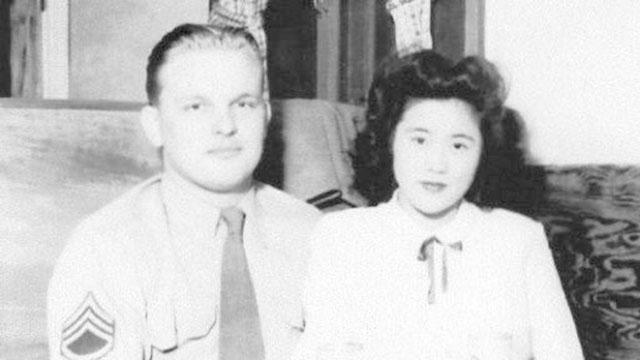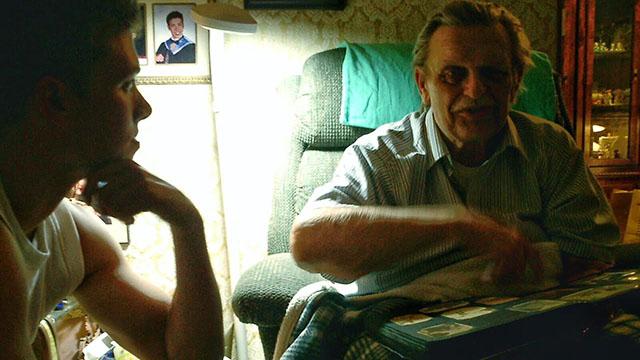"One of my most prized possessions"

"Every year around August 15th I dust off one of my most prized possessions: an old letter my grandfather wrote me answering my questions about his experiences in the postwar occupation of Japan. Today, on the 73rd anniversary of V-J day, I'd like to share some excerpts."

Michael Bosack is a Ph.D. student at International University of Japan in Niigata Prefecture, specializing in Asian security and Japanese politics. After graduating from the United States Air Force Academy, he served in Afghanistan and worked at Yokota Air Base in Japan.
Michael's grandfather fought in World War II and, after it ended, came to Japan as a member of the Allied Forces. There, he fell in love with the voice of a telephone operator. He tracked down the Japanese woman on the other end and married her.

His grandfather sent the letter around 2005-2006, when Michael was studying at the Air Force Academy.
"The letter was the product of a desire to have written down all the stories that my grandfather used to tell me when I was growing up. So as a child, and a young teenager, I would visit his house in summer time and he would always stay up late and tell me stories. And when I got to college, and I started doing research about the postwar occupation of Japan and regional security, I thought this would be very valuable to have the stories in written form. And he loved writing letters and I like writing letters so it seemed to be a good opportunity. So I sent him a letter with a list of questions, and he took his time in writing very thoughtful answers to those questions."

"I had a couple interests when I got into the Air Force. First, I wanted to become a US-Japan alliance manager, and I was really interested in understanding the relationship between America and Japan, and obviously I wanted to know where it started, the occupation. I also was interested in understanding postwar occupations because I knew that, when I went to the Air Force Academy in 2003, we already had occupations ongoing in Iraq and Afghanistan."
What the Letter Says
In the letter, Michael first asked his grandfather about his initial impressions when he arrived in Japan.
"About nineteen miles from Yokohama Station to Tokyo was completely devastated due to the bombing. Nothing but stone steps and chimney remained standing. Factories were almost all gone. Yokohama port was partially spared bombing--because we knew we would have to use the port area for our ships. Yokohama city was almost gone."

Next, Michael asked him what the toughest thing he had to do as a member of the Occupied Forces was.
"Well, the toughest at first was we were organized in squads and directed to go through any housing or buildings to search for any kind of weapons--knives, swords, guns--that had to be confiscated. We had to rudely enter their homes with our combat boots on waving our weapons and scaring the heck out of the people. Job had to be done and most of the GIs did it in as pleasant a fashion as they could. Get this now: most of these men were in combat with the Japanese less than a month or so ago. Of course, there are always a few A-holes--but most of the guys tried to make it go easy. Americans are not Gestapo-like."
Michael added the following when he posted the excerpt:
"His answer made me think about this same type of activity in Iraq/Afghanistan and how different things turned out there. Also, we Americans today need to reflect on his last sentence..."

Michael shared the section he likes most in the letter at the end of his tweet. It illustrates the rapport his grandfather had with the Japanese people he met on the street.
"I was driving a tank with a bulldozer type blade in the front.... I saw this group of older men and women and small kids moving the stone, cement, and brick by hand....I decided to drop the blade and push all the rubble I could as I went through this street. The Japanese were surprised and waved at me. That day I came across two more vehicles with blades and so I did the same thing when I went through that area. Lots of smiling and waving.
"The next day around noon time, as I was driving through a now cleared street, an old timer waved at me from a group of Japanese standing there. I was puzzled, but I stopped (I was armed). The old man came up to my vehicle and handed me a package. I could see through the loose folds it was rice. I thanked him in English.... When I got back to the port, I sought out an interpreter (Japanese) and told him what happened. He said he was surprised as rice was scarce.
"I talked to the mess sergeant...and asked if there were some rations the guys didn't like. In short, he gave me half a laundry bag full.... I got the interpreter to write in Japanese instructions that the C rations could be eaten cold but were better heated up. And delivered the rations to my friendly group on my next trip. They were grateful--food was scarce. A lot of bowing and smiling. Me, big smile. I felt good--and from there I always seemed to get along with the Japanese. Oh and the first two words the interpreter taught me were Thank you (arigato) and sayonara--Ha."
Reaction from Readers
Over 200 people responded to his tweets.
"This was lovely to read, thank you for sharing."
"Wow, this actually really warmed my heart. It's amazing to hear how even after the harshness of war and pure human hatred, love can rise again from the ashes to build everything back up."
A high-school teacher in the US asked for permission to use the letters in his classes.
Others posted pictures and letters of their own relatives who served in war.
"My great grandfather was also in the military and met my great grandmother in Japan."
"Here is page one from my grandfather writing home from London shortly after D-Day. His descriptions of the effect on civilians is vivid."
Michael says he couldn't anticipate these reactions.
"The most surprising thing was just the amount of love and hope that came from all of the responses. I think part of it was people felt connected to their own relatives, that they didn’t have a chance to get their stories in writing. It was almost if they were reading a letter of their own grandparents and I think that’s why many of them are moved. Also, with everything going on in the world today, the racial divide, the conflict, and different wars throughout the world, I think that people see that America and Japan, no matter how strong the war was fought in WW2, at the person-to-person level after the war they were able to connect and show camaraderie and support and love for each other. I think that’s another reason why people responded so strongly it."
Message for the Future
Michael's father was also a serviceman in Japan, so he's spent nearly half of his life in the country. He chose to share the letter this year because the Heisei era is ending and he thought it important to keep in mind what happened in the past as Japan heads forward.
"For the Japanese, I want them to remember that this relationship between America and Japan is a good one that should be considered a benefit for as long as the two countries exist."
He points to how the two countries came together, after fighting a war, to rebuild Japan and make it a symbol for democracy and freedom in the world.
"I think Japan has done a very good job rebuilding itself and becoming this world leader that is willing to have restrictions on its military capabilities in order to become a stalwart symbol. I think that when Japan goes into this next era, and looks at the different changes that possible, the big one being constitutional amendment, and what direction they need to take Japan, I hope that people continue to look to the past and see what Japan did to rebuild its country and the best aspects of that and they hold on to that in this next era."
He adds that he hopes the letter will have a message for Americans, as well. He says there is currently a desire within the country to become more 'insular' and to put its interests first.
"I think that when you look at these letters, it’s not about America first. It’s about America’s role in the world and the good that can come from it, as well as the importance of having relationships with people outside America. I think that translates as well to what’s going on inside the United States, and how people should look at each other and treat each other with love and respect. If people can do that after the war, they can do it to their neighbors at home. So that's what I would like for Americans to take away."
"And for the world, I just want everybody to take away that no matter what conflict occurs, the most important thing people can do is show love and respect to each other. That's how you heal, that's how you mend."
Understanding History from the Voice of Individuals
Most knowledge of WWII is passed down through history textbooks. But as time passes, the number of people who can provide a different, important source on the war is dwindling. Firsthand accounts provide a crucial view into how the war affected everyday lives. Letters like those from Michael's grandfather depict how ordinary people went about their lives and the way their feelings changed after meeting old enemies. They are precious windows into the past and should be passed on to the next generations.

